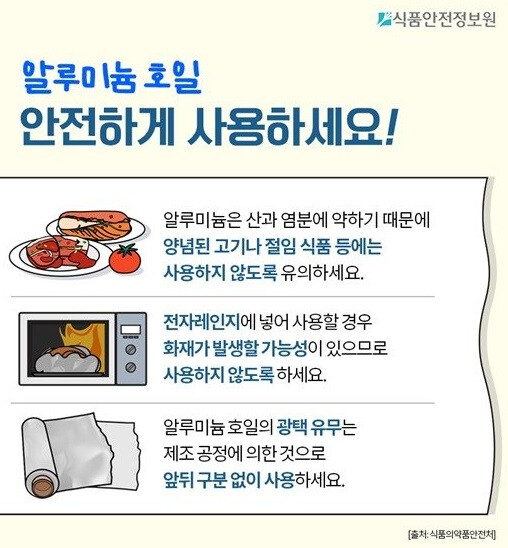
Seoul, South Korea – While convenient kitchen staples, aluminum and parchment foils each come with specific guidelines for safe use, particularly when it comes to certain foods and cooking methods. Recent advisories from the Korea Food Safety Information Service (KFSI) highlight crucial distinctions, such as why wrapping plain pork belly is generally fine with aluminum foil, but marinated ribs are not.
The KFSI announced on July 2nd that it will be distributing card news and other educational materials to help consumers understand and practice the correct usage of aluminum and parchment foils. This initiative aims to enhance kitchen safety and ensure proper food handling.
Understanding Aluminum Foil
Aluminum foil is made by rolling thin sheets of an aluminum alloy. Generally, the amount of aluminum ingested when using it for cooking or food storage is considered safe and poses no harm to the human body. The body typically absorbs very little aluminum, and in healthy individuals, most of what is absorbed is filtered and expelled by the kidneys.
However, aluminum is susceptible to acidity and salt. This is why it's not recommended to allow highly acidic or salty foods, such as marinated meats or pickled items, to come into direct contact with aluminum foil. When exposed to these substances, aluminum can leach into the food at higher rates. While the immediate health impact of small amounts is often negligible, prolonged or repeated exposure, especially with highly acidic or salty foods, is best avoided.
Furthermore, a critical warning accompanying aluminum foil use is its absolute prohibition in microwave ovens. Placing aluminum foil in a microwave can cause an arcing reaction, leading to sparks, potential damage to the appliance, and a significant fire hazard. The metal reflects the microwaves, causing an electrical current to build up, which can ignite.
Understanding Parchment Paper
Parchment paper, also known as baking paper, is a different product altogether. It's typically made from paper that has been coated with a synthetic resin, such as silicone, to enhance its heat resistance and non-stick properties, as well as make it waterproof or greaseproof. This coating makes parchment paper a versatile tool for baking and cooking.
Parchment paper is generally considered safe for food preparation and storage when used according to its specifications. It is regulated by relevant standards and regulations to ensure its safety. Key precautions for using parchment paper include:
Avoid direct contact with open flames: While heat-resistant, direct exposure to a burner or grill flame can cause it to catch fire.
Adhere to the maximum temperature rating: Each product will have a specified maximum temperature it can withstand, usually printed on the packaging. Exceeding this temperature can cause the paper to degrade or burn. For instance, most parchment papers are safe up to 400-450°F (200-230°C), making them ideal for oven use.
Why the Distinction Matters
The core difference lies in the material's reaction to different environments. Aluminum is a reactive metal, particularly with acids and salts, and is a conductor of electricity. Parchment paper, on the other hand, is designed to be inert and heat-resistant, acting as a barrier.
"Kitchen foils are incredibly convenient and hygienic for food preparation and storage, but it's crucial to be aware of the specific properties and recommended uses for each material," stated Lee Jae-yong, head of the Korea Food Safety Information Service. "We hope that through these educational materials, consumers will become well-versed in proper usage, thereby creating a safer cooking environment."
For those who witness violations related to food safety or suspect a product is contaminated, reports can be made to the Integrated Food Safety Reporting Center. By understanding these simple yet vital guidelines, consumers can ensure both the safety of their food and the longevity of their kitchen equipment.
[Copyright (c) Global Economic Times. All Rights Reserved.]




























